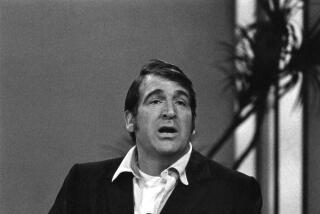Reflections : The Author’s View of Graham Greene : A 1989 discussion revealed much about how the leading British writer, who died last week, felt about religion, sex and death.
- Share via
LONDON — Graham Greene, Britain’s foremost writer who died Wednesday at 86, was a converted Roman Catholic whose religion infused his rich and varied body of work.
Greene, who was buried Monday in Switzerland, was rarely interviewed and often elliptical when questioned.
But in a 1989 discussion with writer John Cornwell in London’s Catholic weekly, the Tablet, Greene made the most revealing comments about himself, God, sex and death that he ever put on the record.
In Cornwell’s first question about why the writer chose to live in a small apartment in Antibes on the French Riviera, Greene replied: “I came to live here so as to be near to the woman I love. I have a girlfriend, a friendship of some 30 years. She lives close by. We see each other most days. She is married to a Swiss husband. But he is . . . complaisant.
“All parties are in agreement. My friend and I usually have lunch together, spend the afternoon together.”
Asked what sort of Catholic he was, Greene said: “I call myself now a Catholic agnostic. I go to Mass, usually on a Sunday. I’ve got a great friend, a priest from Spain, Father Leopoldo Duran, who if he comes here, says it at that table.
“To please Father Duran, I make a confession of about two minutes, though I’ve nothing much to confess at the age of 85. There’s plenty in my past to confess, which would take a long time, but there’s nothing in my present because of age.
“And lack of belief is not something to confess. One’s sorry, but one wishes one could believe. And I pray at night that a miracle should be done and that I should believe.”
Greene’s characters, it was suggested, were often trapped between their weaknesses and their consciences, but did he believe in the devil? “No. I don’t think so.”
In angels? “No, I don’t really.”
In hell? “I don’t believe in hell. I never have believed in hell. I think it’s contradictory. They say that God is mercy. I feel that purgatory may happen in this life, not in a future life.”
Survival beyond death? “Well, I would love to believe in it. And there is a mystery somehow. And one would like to let it be more than this world.”
In heaven? “I couldn’t conceive what heaven could be. If it exists, it’s an entity I can’t visualize in any way. My idea would be that it would be something active, rather than happiness with people one had loved, a form of activity in which we could influence life on Earth.
“I think that an inactive heaven is rather a sense of boredom.”
To the suggestion that belief might be a struggle for him, Greene indicated that St. John’s Gospel helped him: “It’s almost a reportage, it might have been done by a good journalist, where the beloved disciple is running with Peter because they’ve rolled away from the tomb, and describing how John manages to beat Peter in the race. It just seems to me to be firsthand reportage, and I can’t help believing it.”
As for his faith?
“One is attracted to the faith. Believing is the problem.”
After speaking about his visits to a Trappist monastery, Greene was asked whether he wondered what it would be like to be a monk. “I’m afraid I like women far too much for that,” he said.
Did he like the idea of being considered a Catholic writer? “I always claim not to be a Catholic writer,” he said. “They only discovered that I was a Catholic after I wrote ‘Brighton Rock.’ I’m a writer who happens to be a Catholic. Not a Catholic writer. And that’s what (Pope) Paul VI meant when he told me that my books would always offend some Catholics and that I shouldn’t pay any attention.”
Did he find the current Catholic church to his liking? “I’m very uncomfortable with the church’s teaching on contraception. I think that contraception is vital for human life. And instead of that, through the church’s teachings, you have an increase in abortions.”
Though he was separated but never divorced, did he have long-term relationships with women? “I have had close relationships with women for quite long periods: 12 years, 11 years, 3 years. 30 years. They were not one-night stands, as it were.”
Did he see anything morally wrong with having mistresses?
“It depends on the three people’s point of view, if they’re happy that way. Were I living with a wife, I wouldn’t like to have a mistress in secret.”
Did he think often of death?
Greene laughed. “I think it’s time for a drink. What can I get you?”
What, in the final analysis, did religion mean to him?
He raised a vodka martini to his lips and said: “I think it’s a mystery. It is a mystery which can’t be destroyed--even by the church. A certain mystery .”
Bibliography
Graham Greene’s writing included novels short stories, plays and screenplays, poetry, memoirs, biography and other works. Here is a list of Greene’s fiction.
The Man Within, 1929
The Name of Action, 1930
Rumour at Nightfall, 1931
Stamboul Train: An Entertainment, 1932 (published in U.S. as Orient Express, 1933)
The Basement Room and Other Stories, 1935
The Bear Fell Free, 935
A Gun for Sale: An Entertainment (in U.S. as This Gun for Hire: An Entertainment), 1936
Brighton Rock (in U.S. as Brighton Rock: An Entertainment), Laver and S. Townsend Warner), 1939
Twenty-Four Stories (with J. Laver and S. Townsend Warner), 1939
The Power and the Glory (in U.S. as The Labyrinthine Ways), 1940
The Ministry of Fear: An Entertainment, 1943
Nineteen Stories, 1947; augmented edition, as Twenty-One Stories, 1954
The Heart of the Matter, 1948
The Third Man: An Entertainment, 1950
The End of the Affair, 1951
Loser Takes All: An Entertainment, 1955
The Quiet American, 1955
Our Man in Havana: An Entertainment, 1958
A Visit to Morin, 1959
A Burnt-Out Case, 1961
A Sense of Reality, 1963
The Comedians, 1966
May We Borrow Your Husband? and Other Comedies of the Sexual Life, 1967
Travels With My Aunt, 1969
Collected Stories, 1972
The Honorary Consul, 1973
The Human Factor, 1978
Doctor Fischer of Geneva, 1980
Monsignor Quixote, 1982
The Tenth Man, 1985
The Captain and the Enemy, 1988
SOURCES: The Writers Directory, 1990-92, and Great Writers of the English Language
More to Read
Sign up for our Book Club newsletter
Get the latest news, events and more from the Los Angeles Times Book Club, and help us get L.A. reading and talking.
You may occasionally receive promotional content from the Los Angeles Times.










